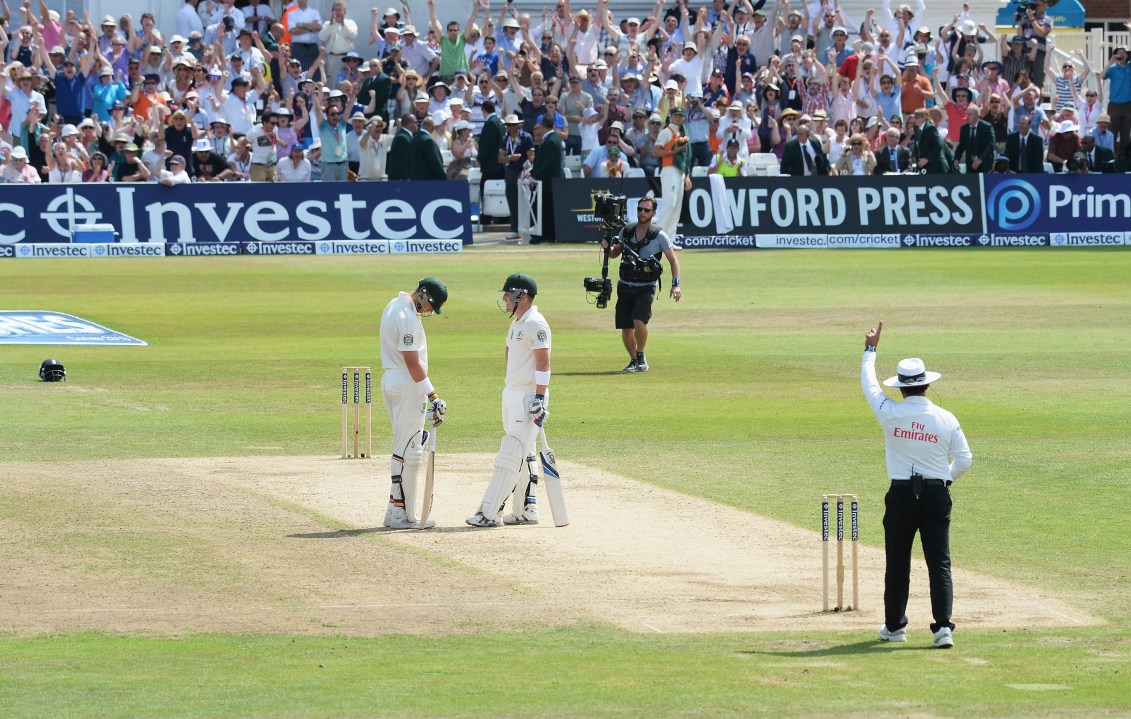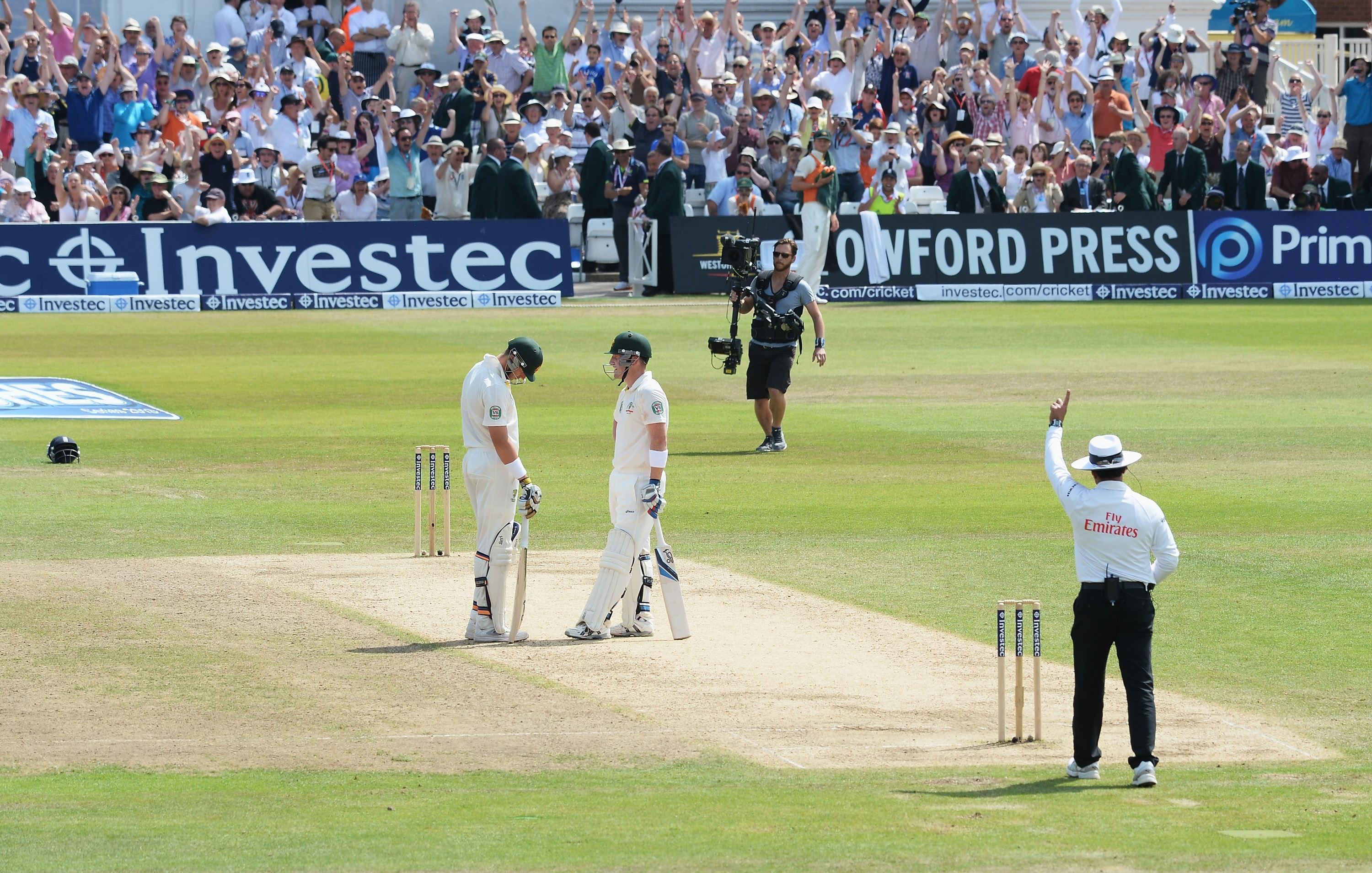Four months ago I wondered if this might be the worst Australian side in history. Previous contenders for that badge of shame were weakened by political disputes at home. Michael Clarke’s XI is the best available or, rather, the best available in the view of the Australian selectors. There are no excuses. No Packer disruption, no Chappell retreating to his tent, no nothing.
And little that happened at Trent Bridge has caused me to change that view. Many of us suspected Australia were likely to perform more strongly in England than in India but that does not make Clarke’s XI a vintage Australian side. Recalls for Chris Rogers and Brad Haddin have stiffened the team; they have not transformed it.
Shane Warne has written a column for the Telegraph claiming that Australia are now well-placed to win the series 2-1. They’re happier than England, he says! Spin the other one, Warnie. Ridiculous as that is, it’s not even the most preposterous article published by the Telegraph this week. Step forward Dan Hodges! I can only surmise that Mr Hodges’ mind has been melted by his recent praise for Ed Miliband, for there is no other sensible – or even idiotic – explanation for his ludicrous suggestion that “Every true Englishman should pray for an Australian victory at Lord’s”.
Not being any kind of Englishman, I am made of stiffer, sterner stuff. Like England’s greatest captain I am of the view that “We’ve got the bastards down there, and we’ll keep them there.” This is no time for patronising generosity. Nor is it a moment for leftist claptrap or post-colonial guilt. When an Englishman is tired of thumping Australia he is tired of life.
According to Mr Hodges, however, the Ashes risk being devalued if England trounce our Australian visitors too completely. If England win this series comfortably and then win again in Australia this winter we may, according to Mr Hodges, “have witnessed our last great Ashes series”. Tosh and pifflesticks to that barmy notion.
It is true that England have won three of the last four confrontations between the ancient foes. But the books have not yet been settled, not by any measure. There is still the memory of the 5-0 horror of 2006-7. Then there’s the recollection of the entire 1989-2003 period. Those were green and golden years, the memory of which remains appalling. The collective score across those eight series? Australia 28, England 7.
No, we shall not forget that. Not yet. And not for many years neither. Since 2005 England have won eight tests and – would you believe it? – Australia have won eight too (a further five tests have been drawn). If England have had a broad edge (ha!) more often than not, their supremacy has not touched the levels the Aussies enjoyed in the age of Taylor and Waugh, Warne and McGrath.
Besides, England need to win this series if only to square the historical record at 31 series victories apiece.
Mercifully, there is no reason to suppose they will not. There was much to admire about Australia’s splendid performance at Trent Bridge. They will have their moments in this series and English victory can never be taken for granted. Nevertheless, England should have won much more easily than they did.
It was a magnificent test match, the kind of contest that reaffirmed your faith (if you needed it reaffirmed and if you did then shame on you) in test cricket. But part of what made it so magnificent was that so much of it was so magnificently improbable.
Australia came within 14 runs of victory but had they prevailed it would have been one of the greatest heists in the history of Australian test cricket. As a general rule, it is not an encouraging sign when the last wicket adds nearly 40% of the runs you score in the match. Yet that is what happened to Australia in Nottingham.
So what’s more probable? That Australia will again be deep in trouble at 117/9 and 231/9 or that the tenth wicket will again add 163 and 65 runs? I think we know the answer to that. The balance of these probabilities does not favour the Australians. Trent Bridge was wondrous; it was also some gorgeous accident.
But that’s the beauty of sport. Nevertheless, while we may respect the Australians there is no reason to suddenly fear them. To win or even draw this series they will have to play far above their past accomplishments. It is worth noting, again, how modest many of those accomplishments are.
To wit: Shane Watson has not made a test century since 2010. In 30 innings since he has only compiled four scores above 50. Steve Smith, improved or not, has yet to make a test century at all. Ed Cowan, nice, intelligent Ed Cowan, has one test century in 32 innings and an average of 31. Usman Khawaja, 26 years-old now, has a test average of 29. David Warner averages 28 in his ten most recent test innings. Philip Hughes batted splendidly at Trent Bridge and is always good viewing but his overall test record remains less than it should be.
Rogers and Haddin are dependable types, of course, and Clarke himself will score heavily at some point. Even so, only Clarke would be certain of a place in the top seven of any composite side drawn from the two teams. To adapt Milton, these Australian Samsons are now runless in Gaza.
As for the bowling, well, Pattinson is a talent and Peter Siddle the kind of broad-shouldered, stout-hearted bowler any skipper loves to captain but that’s about it. With Swann and Anderson in the composite side there’s room for, at best, three Australians. That’s why England should win. Man for man they are the better team.
There’s nothing wrong with winning. Put aside notions of English (or British) reserve and embarrassment. This is a splendid era for English and British sport. With the notable exception of the footballer – but who cares about them? – almost every other flower in the British sporting garden is in bloom. Britain, it turns out, can be rather good at sport. (Especially sports not much played in much of the world.) Fretting about this is silly. Yes, it will rain again but that’s no excuse for failing to enjoy the sunshine. The Ashes wheel will one day turn again; all the more reason to make the most of England’s success.
When an Englishman is embarrassed by the prospect of thumping the Australians he has lost his moral compass and deserves to be cast into the wilderness. There is a place for people like Dan Hodges and I think it may be called Pitcairn Island.








Comments